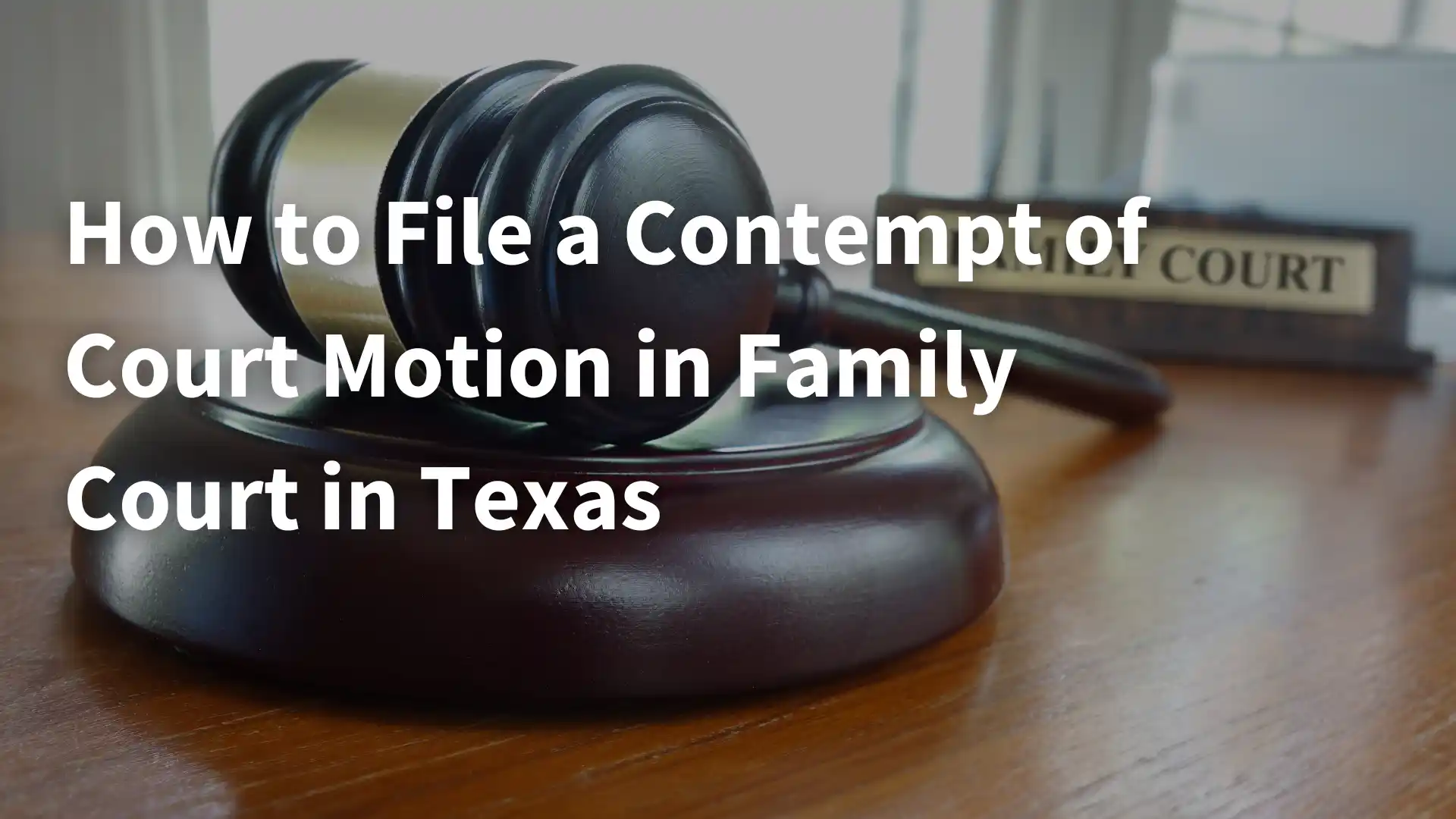Family law matters intersect with life’s most sensitive and private matters. Naturally, emotions may run high, but one party might refuse to obey a court-mandated order concerning child support or custody. If one party disobeys a court order, they can be held in contempt of the court—often through a Contempt of Court Motion in Family Court, which seeks to enforce compliance and uphold the court’s authority.
In these cases, the opposing party can file a contempt of court motion in family court. Filing a contempt of court order can force compliance and punish the offender, but it can also complicate proceedings. You must understand how to file a contempt of court motion if you are currently in a support or custody dispute, as contempt proceedings in child custody and support cases can play a critical role in enforcing court orders.
What Is a Contempt of Court Motion in Family Law?
The Texas Supreme Court has defined contempt in a court setting as disobeying a court or acting in opposition to its authority. In family law, this is often the case when one party refuses to obey a court-mandated divorce order regarding child support or custody.
According to the Texas Family Code, Texas courts can hold a person in contempt if they knowingly refuse to comply with a court order. The opposing party can file a motion for enforcement, and the court can enforce the order through contempt charges. Contempt of court is usually reserved for cases where it can be proved that the offender intentionally and repeatedly violated an order.
Types of Contempt in Family Court
There are two main types of contempt in family court. The difference between the two is where and when the offense occurred.
Direct vs. Indirect
Direct contempt concerns violations in the judge’s presence and the courtroom, such as disrespecting the judge, displaying poor conduct, or being aggressive. Indirect contempt concerns actions outside the courtroom, such as refusing to obey an order, not attending a hearing, or having inappropriate communications with involved parties.
Civil vs. Criminal Contempt
Contempt in family courts may also be civil or criminal. Whether contempt is civil or criminal depends on its purpose. Civil contempt is meant to be coercive and compel a specific behavior, and the punishment ends when the offender complies. Criminal contempt serves as a punishment, and the duration of the sentence is not dependent on compliance with the order.
Common Reasons for Filing a Contempt Motion in Family Court
Below are some specific examples of family court order violations where one party might file a contempt of court motion:
- A parent refuses to return a child on time after a scheduled visitation
- A parent repeatedly refuses to make court-ordered child or spousal support payments
- One party contacts or harasses the other despite a legally binding protective order
Punishment for Contempt of Court in Texas
The point of contempt of court is to punish the offender for disobeying and to force compliance with an existing order. The court has several family law enforcement remedies, including:
- Fines – Contempt of court charges might involve civil penalties and other punishments.
- Wage Garnishment – In unpaid child or spousal support cases, the court can garnish the offender’s wages or seize their tax returns.
- License Suspensions – The court might impose administrative penalties, such as suspensions of driver’s and professional licenses, as well as hunting/fishing licenses.
Can You Go to Jail for Contempt of Court?
Yes, jail time is a possible punishment for contempt. The nature and length of confinement depend on the court where the offense occurred.
In justice and municipal courts, a contempt of court charge can carry up to three days in prison. In any court aside from justice and municipal courts, punishment can include up to six months in jail.
Whether the contempt is civil or criminal also affects confinement terms. If the confinement is for civil contempt, the confinement ends when the offender complies with the order. If the confinement is for criminal contempt, the punishment term is fixed and not dependent on compliance.
Filing a Contempt of Court Motion
To introduce contempt charges, one party must file a Motion to Enforce and for Contempt with the appropriate court. This motion identifies the specific court order and violation under consideration. After filing the forms, the filer must notify the other party and prepare for a hearing.
During a contempt hearing in family court, each side presents evidence and arguments for its position. If the judge decides necessary, they can schedule a second evidentiary hearing. A family law attorney can help prepare for a contempt hearing by gathering evidence and representing clients during hearings.
Filing for contempt of court can result in lengthy and expensive proceedings rife with conflict, so it’s vital to assess all possible options for resolution beforehand. Given the circumstances, an attorney can guide whether contempt proceedings are ideal.
Defenses Against Contempt of Court
Contempt of court requires that the offender intentionally and knowingly violate the terms of an order. As such, a common defense in contempt proceedings is ignorance. If the offender was unaware of the order or made a good-faith error in interpreting it, it could serve as a defense against contempt charges.
Another possible defense is that the offender could not comply with the order, whether due to financial hardship or illness. If a person genuinely cannot fulfill an order, they cannot be held responsible for violating its terms.
Contact Our Divorce and Custody Attorneys in Texas
Contempt of court is a serious matter and is usually a last resort in family law matters. If you are planning to file a contempt of court motion or are facing a judgment of contempt, having an experienced family law attorney in Texas on your side is essential. Our team is here to help you understand your rights and take the first step toward securing the necessary benefits. Smith & Bledsoe Family Law can help organize your case and provide general legal guidance for a satisfactory resolution.
Contact Smith & Bledsoe Family Law online or call (512) 277-3166 to speak to a divorce and family law attorney in Austin, Texas.
Related Post
Steps to Strengthen Your Custody Case in Court
AOP: How Do You Get a Court-Ordered Paternity Test in Texas?

